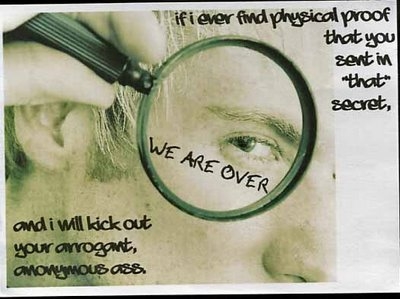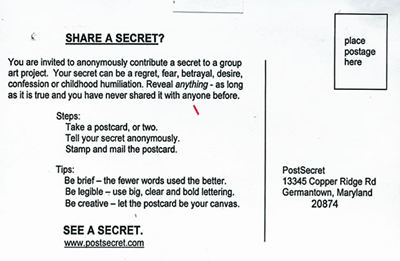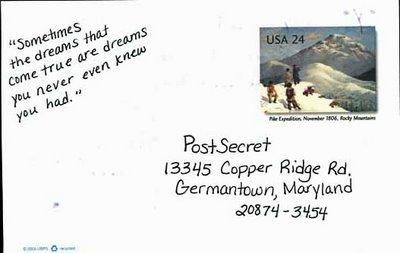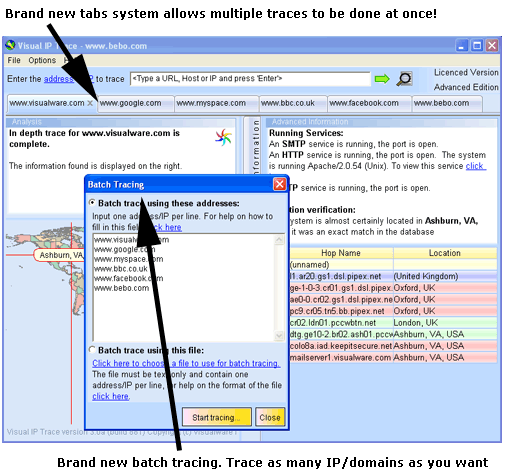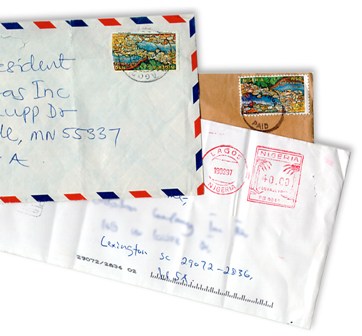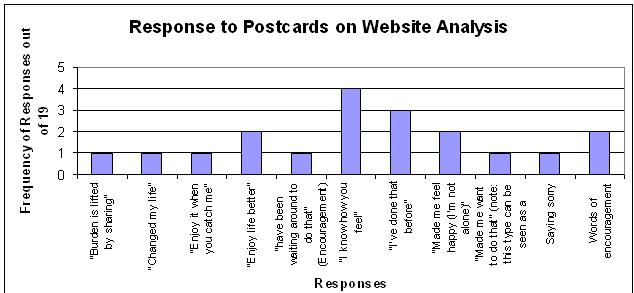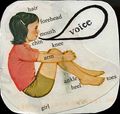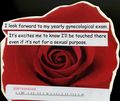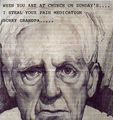Courses/Computer Science/CPSC 203/CPSC 203 2007Fall L04/CPSC 203 2007Fall L04 TermProjects/Public Secrets
Contents
Project Title: Effects of Online Secret Sharing on Feelings of Isolation
Group Members
Tracy Herbert
Andrey Kuzyk
Natalie Wong [1]
Ulzhan Salimbayeva
Norah Gafuik
Introduction
"There are two kinds of secrets: those we keep from others and the ones we hide from ourselves." ~ Frank Warren
The word secret originates from the Latin word secretus, meaning separate or set apart. Therefore, the possession of secrets creates a certain separation between a person
with a secret and another who doesn’t know it. One may wonder, ‘Can that secret create an inner separation within the person holding it?’
This project will explore the psychology of secret making, secret sharing, and the emotional effect of an individual letting go of a secret. Because it is such a personal issue it should be taken into consideration that there are many opinions concerning secret sharing. However, the focus of this project is on the positive effect of secret sharing on both the individual and the society. It is claimed here that secret sharing reduces the feeling of isolation of an individual confessing the secret, as well as for individuals who learn the secret. Therefore, secret sharing reduces the separation of the individual within the society and within him/herself. In making this argument, the technology of PostSecret.com will be analyzed.
The History of Postsecret
PostSecret.com was originally developed as an art exhibit to be displayed at Artomatic 2004 in Washington, D.C. The idea behind it was fairly simple. The public was asked to anonymously decorate the reverse side of a homemade postcard with their inner-most, darkest secret. Participants were given two conditions: 1) the secret must be a secret that has never before been revealed and 2) the secret has to be completely true.
The mastermind behind this idea was Frank Warren. He printed 3,000 postcards and gave them to strangers, requesting that they send it to his home address, in Germantown, Maryland, once completed. Warren claimed to have stopped giving out postcards a few weeks after he started but hundreds of secrets continued to arrive at his home from all over the world. The secrets varied from aspirations, regret, fear, betrayal, desire, confession, childhood humiliation and criminal offences.
Warren took the exhibit to the internet as a weekly blog on January 1, 2005, to display the postcards as an ongoing community art project. To ensure that the site remained non-judgmental, the comment section of the blog was short-lived.
Currently, new postcards are displayed every Sunday. At the end of each year, Warren’s favorites are complied into a book. According to Warren, he has received more than 150,000 postcards from all over the world in the three years since the initiation of PostSecret.com. According to Technorati, a blog tracking service, PostSecret.com is the third most visited blog, based on links from other blogs.
"[PostSecret.com] allows people to remove their social masks," says Warren, sitting in a break room at CNN Center. "I want to respect that. ... I've tried to earn this trust strangers have placed in me." And he did. In fact, in the foreword in one of his book, the publisher writes that Frank Warren was regarded as 'the most trusted man in America' in a short period of time.
What Happens to the Postcards?
There is a system in place to safely deposit hundreds of secrets from individuals’ homes to a website viewed by thousands. First, a postcard is made with a secret placed on it. Next, the card bearing the deep secret is put into an envelope, stamped and sent to:
Post Secret 13345 Copper Ridge Rd Germantown, MD USA 20874-3454
The postcard is then delivered directly to Frank Warren. He is the only one who looks through the hundreds of secrets delivered to his mailbox each week. Therefore, unlike other secret sharing websites, PostSecret.com distinguishes itself by being personal, creative, and most importantly, anonymous.
In addition to anonymity, Frank Warren had turned down many offers on several talk shows because of his concern that hosts may highlight some of the more childish postcards or make fun of the more somber ones. He considers this endeavor, which began in late 2004, as a sacred and trusted public arts project, and is careful not to violate that covenant.
Post Card VS Email
Because we currently live in the age of rapid technological development, it is fair to wonder if it is possible to achieve the same level of anonymity using the internet versus the post office. Many may ask: “Why use post cards, when email seems much easier and convenient?” To answer that let us take a deeper look into both old and new ways of sharing a secret.
Posting Online
As safe as the internet is often promoted to be, there are several critical downfalls left unconsidered or undisclosed to the general public. For example, every time one enters any website, a “business card”, also known as an IP address, is left.
The following information is taken from the Florida Computer Crime Center's Training program, Introduction to Internet Investigations:
The IP address, or Internet Protocol address, is the most common way to track back to an individual on the Internet. An IP address is similar to the street address on your house, but it identifies the location of a computer or device on a network.
The format of an IP address is numeric, written as four numbers separated by periods. Each number can be 0 to 255. For example, 72.14.253.99 is the IP address of google.com and 216.194.201.126 is IP address of PostSecret.com.
Web site owners often obtain a static IP address from their service provider in order to host their website. The service provider will have information on the individual or business that maintains the site and pays the monthly charge. This information can be found by using the disabled-URL (uniform resource locator, or the domain name of the site) and one of several online utilities. One such utility is CentralOps.net.
Given this information, it would not be difficult to find out who posted a secret from a specific computer. Though it is slightly more difficult to track secrets that were posted from other computers, it is not too difficult for an average person to do this at any given time.
Another effective way of tracking down one’s secret is through an email address. In cases where people share their email addresses, one can track an address through a "secret-posting" site.
Mailing Postcards
The old method of communication, that of postal mail, seems to be a more anonymous method of submittal. This is because the documents cannot be read by anyone other than the receiver. For instance, in the United States, it is a violation of Federal Law for anyone other than the receiver to open mail. However, exceptions do exist such as postcards, which can be read by the postman for the purpose of identifying the sender and receiver. For mail contained within an envelope there are legal provisions in some jurisdictions allowing the recording identities.[4]. Therefore, one must break the law in order to view mail inside an envelope.
Although police and special services are exceptions to this law, they are still restricted to some degree. One may try to go to Frank Warren's residence and try to get a postcard of interest, but this would most likely fail. Furthermore, even if one retrieved a postcard he/she would need a DNA-scanner to find the identity of the person who sent it.
In conclusion, in the case of online posting, anybody with internet access and basic knowledge or motivation can try to track a sender through his/her IP address. This is impossible when sending a postcard through the mail.
Another benefit of mailing a postcard is the unique homemade design used from each sender; thus one can express him/herself better through creative pieces of art if they choose to.
The Psychology of Secrets
Why do people keep secrets?
Social Psychology has asked this question for many years. Research findings have come to the agreement that people keep secrets because they deeply fear the disapproval of others. The more people believe they will be socially rejected as a result of disclosing a secret, the more reluctant and ashamed they are to do so. For example, victims of incest often fear that disclosing their secrets will have consequences such as being abandoned, accused of lying, being punished, or being blamed for the incestuous contact. (Rodriguez and Kelly, 2006)
Is Self-Disclosure Good?
There is a long-standing belief that disclosing secrets is good for a person. It is believed to heal the soul. The effects and processes of secret disclosure have been studied by social psychologists for decades. Several studies, including Taylor, De Soto and Lieb (1979) have found that people are uncomfortable and often unwilling to disclose intimate secrets to large groups of people. They are more comfortable, though still anxious, when disclosing to just one person.
Why Self-Disclose Anonymously?
Disclosing secrets to acquaintances can have damaging, painful effects. Confidants may accuse or withdraw from the discloser. How do effects of self-disclosure change when it is done anonymously? Many studies have shown that disclosing private traumatic experiences in an anonymous manner, such as journaling, drastically improves recovery. Patients who engage in anonymous self-disclosure recover more quickly with fewer physician visits (Rodriguez & Kelly, 2006). Further, a study by Rodriguez and Kelly (2006) found that individuals came to feel a reduced sense of alienation when they had written intimate secrets and imagined they had revealed them to accepting, discreet confidants (Rodriguez & Kelly, 2006).
Anonymous Self-Disclosure Online
Recently, a study by Qian and Scott (2007) has combined the previous research results explained above and researched anonymity and self-disclosure on weblogs. Their research found that the more anonymous a person was online, the more they self-disclosed on many subjects. Further, their perceived target audience highly influenced the amount and content of self-disclosure.
Advantages of PostSecret.com
Nearly everyone has intimate secrets we are afraid to reveal. We fear the consequences of revealing them and so we submit ourselves to feelings of isolation. PostSecret.com provides a medium in which to self-disclose intimate secrets, free of anxieties and consequences. We can easily imagine the PostSecret.com audience as compassionate, accepting people based on the secrets they post and comments made following some of them. Further, PostSecret.com allows us to be as anonymous as we like. We can give our secret a personal touch through our creativity in constructing the postcard, while remaining completely unknown to our audience. Thus, in posting secrets on PostSecret.com, we can reduce stress and promote long-term mental health, including the reduction of feelings of isolation.
Secret Case Studies
Content analysis: Data was collected from September 29, 2007 - November 9, 2007. Every week, the number of postcards in each category were tallied and at the end of the observations, tallies were summed for each category to show which category had the most postcards about it.
Post secret not only allows fans to secretly mail in their postcards, but also allows others to send responses about their feelings towards some of these postcards. With the same instrumental analysis, responses were tallied each week and categorized.
Flaws in research:
1. Only 20 pictures were picked out of thousands
2. Only positive responses are shown, no negatives or judgmental responses therefore this is not a representative sample
3. No comparison with other websites to determine if secret sharing in general is beneficial
What are the most common secrets from Post Secret
Figure 1: Pictures from the Postsecret website were analyzed and categorized. The most common categories in which anonymous ailers have secrets about can be seen here ranked 5 (as the most amount of secrets in the category) to 1 (as the least amount of secrets in the category).
Figure 2: Although Religion, Problems with Children, Family and Pregancy and Postcards of a Sexual Nature were among the top three postcard categories, it can be seen here that the most common secret sent was about people's sexual nature. (16/100 pictures viewed from September 29, 2007 to November 9, 2007).
Figure 3: This chart shows the response "I know how you feel" (4 out of 19 responses in total from September 29th to November 9, 2007) as the most common type of response, followed with "I've done that before" (3 our of 19).
Good Replies
Dear Frank,
I feel the same way. I often wonder why I even have a phone because I rarely receive calls. If there was a way we could contact each other that would be cool. My phone number is 605-212-7787 (with permission).
Frank,
Earlier today, I saw the secret about having the cool toy iPhone and still not getting any calls and it resonated with me. I couldn't believe when I checked later this evening and saw the reply, including his phone number.
It's pretty gutsy to have your private phone number published on a website that people read worldwide. I decided to call. Immediately I was glad I had. [He] answered by the third ring, and was so excited, so high on life, that it made me smile and has left me smiling ever since, something that's been rare for me lately.
That South Dakotan stranger has heard from people from around the world, wishing him well, and reaching out to a person who was brave enough to admit they, too, were lonely. I hoped to help him smile and feel like he mattered and that people are basically good; yet those were the things our brief conversation gave to me. Subject: Homeless
I know how you feel. I drive my police cruiser a lot faster responding to an animal in distress call, then I do for people in distress.
I'm a police dispatcher and I feel the same way. I take extra time and make additional calls to help animals because they are innocent. Subject: I think this is from my soon to be ex-wife
I know you are hurting and you have no idea how sorry I really am. I really do want you to be happy.
Sent: Monday, October 08, 2007 10:34 PM
I put my secrets in a couple of the new books. I can honestly say that it is true, I did feel like a burden was lifted off my shoulders. I couldn't get that smile off my face the whole day. " it spoke louder than any words of support from any of my physicians.
Conclusion
To Conclude the study, it was found that categories concerning Religion, Problems with Children, Family and Pregnancy and categories of a sexual nature were among the top three secret subjects fans would most likely reveal. Amid the top three, fans revealed more secrets about their sexual nature than any other secret category observed. It was also found that responses with the "I know how you feel" general statement occured the most followed with "I've done that before". This shows that other viewers are able to connect to these postcard senders on a general and even person level alleviating their own discomforts and fears.
Conclusion
Based on the above statements and case studies, it is concluded that secret sharing does indeed reduce feelings of isolation in those confessing secrets, given the supportive, encouraging and safe environment of PostSecret.com
References
Norah
- Frank Warren on Artomatic 2004
- USAtoday interview with Frank Warren
- PostSecret popularity blog
- PostSecret International Art Exhibition
- PostSecret Community
- PostSecret Charity Tour
- Boston news PostSecret
- Post Cards Featured in the All American Rejects Music Video
- The "accidental artist"
- PostSecret Video narrated by Warren
Ulzhan
- PostSecret's Success
- Frank Warren Tour
- CNN Article January 2007
- PostSecret Website Review
- Sharing more than a 'secret'
- Frank Warren Interview
- PostSecret on the News
- How to mail the secrets
- Follow-up messages to Frank
- Definition of secret by the Oxford Dictionary
Andrew
- PostSecret
- PostSecret promotional video
- HarperCollins Publishers: PostSecret by Frank Warren
- 20 Questions with Frank Warren
- Frank Warren Book Signing Photos, Austin, TX
- Video Interview With Frank Warren
- Audio interview with Frank Warren from alt.NPR's Love & Radio
- A Conversation with Frank Warren in MungBeing Magazine
- Warren Interview
- To convert U tube video go here
- Florida Computer Crime Center's Training program, Introduction to Internet Investigations
Tracy
- Qian H, Scott CR (2007) Anonymity and Self-Disclosure on Weblogs. Journal of Computer-Mediated Communication 12: 1428-1451.
- Rodriguez RR, Kelly AE (2006) Health Effects of Disclosing Secrets to Imagined Accepting Versus Non-Accepting Confidants. Journal of Social and Clinical Psychology 25: 1023-1047.
- Taylor RB, De Soto CB, Lieb R (1979) Sharing Secrets: Disclosure and Discretion in Dyads and Triads. Journal of Personality and Social Psychology 37: 1196-1203.
- Vrij A, Nunkoosing K, Paterson B, Oosterwegel A, Soukara S (2002) Characteristics of Secrets and the Frequency, Reasons and Effects of Secrets Keeping and Disclosure. Journal of Community and Applied Social Psychology 12: 56-70.
- Top 5 Places to Post Secrets Online
- Digg.com
- Elliottback.com
- Addicted to PostSecret
- E-Closure.com - Posting Breakups
Natalie
- Post Secret website
- A pile of dog bones
- Wikipedia on PostSecrets
- Another Secret sharing website
- Video Secret sharing
- PostSecret Video
- Procastination - Post Secret
- Post Secret pictures from art photos on webshots
- Ten Questions with PostSecret's Frank Warren
- Post Secret: a collaborative project
Group Responsibility
Norah - Background check (history, creator, The genesis of Post secret
Andrew - Comparison of online posting and sending postcard
Ulzhan - Introduction, Research on what happens to the postcards after they are sent, conclusion
Tracy - Psychological and Sociological background on isolation
Natalie - Case study on postcard content analysis and responses
Other
Favorite Secrets of Andrew:
Favorite Secrets of Ulzhan
Favorite Secrets of Tracy:
Favorite Secrets of Natalie:
Favorite Secrets of Norah:
Other Secret Sharing Websites
[3]
[4]
[5]
Videos
PostSecret [6]
Postsecret: A Lifetime of Secrets [7]
